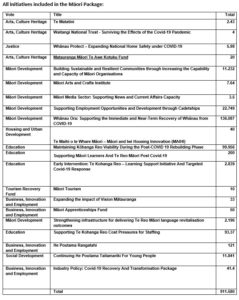 BACKGROUND
BACKGROUND
1. The Government’s “Wellbeing Budget 2020: Rebuilding Together” was released on 14 May 2020. The Budget covers the Government’s spending plan for 1 July 2020 to 30 June 2021, as well as its indicative spending plan for the following three years to 30 June 2024.
2. The World over is staring down the barrel of the greatest recession in decades in the wake of the COVID-19 pandemic and New Zealand is no different. Government net debt is set to increase from 20 percent of GDP to a peak of just over 55 percent, the peak during the painful economic restructuring of the late 1980s.[1]
3. The Budget represents one of the biggest spends in New Zealand’s history as it faces the health and economic crises caused by the COVID-19 pandemic, including establishing a $50b COVID-19 Response and Recovery Fund ($20b of which is yet to be allocated).
4. The Budget has been labelled as politically-astute but criticised for lacking transformational change and being a missed opportunity to reform our economy.[2] This is certainly the case for Māori.
MĀORI-SPECIFIC SPENDING
5. The Budget provides $900m to support Māori including a $400m increase to Māori education, a $200m Māori employment package and a $136m boost to Whānau Ora. The $900m is almost double last year’s Wellbeing Budget which allocated $480m to Māori. However, the 2019 allocation represented 3.2% of the total Budget, whereas the 2020 allocation represents only 2.1% of the total spend.[3]
6. Notable aspects of the $900m include:
(a) $200m for Te Kōhanga Reo which will help ensure kaiako are adequately paid and learning facilities are in good condition in order to support the revitalisation of te reo Māori;
(b) a further $136m to Whānau Ora;
(c) the establishment of a $50m Māori Trades Training fund and $121m for He Poutama Rangatahi;
(d) $40m to help tackle the housing challenges Māori face through the Māori and Iwi Housing Initiative programme; and
(e) $11m for iwi and Māori non-government organisations.
7. The following table outlines the full allocation of the $900m:[4]

REFLECTIONS
8. For Māori, while the level of investment is to be commended, the Budget lacks a clear strategy for transformational change and a long term vision for a new Māori centric economy that truly enables tino rangatiratanga. The budget lacks new and innovative thinking such as social procurement, investment in development of Māori centric business models, public-private partnerships with Māori owned entities and re-structuring the economic rules that support and entrench inequality. Spending on the symptoms without fixing the cause will not result in long term transformational change and Māori will continue to suffer more than others.
9. One reason for the lack of vision may be the paternalistic Government approach that treats Māori as a vulnerable group as opposed to their equal Tiriti partners. Our reo and culture was absent from the daily COVID-19 updates. If there is any time, it is now to showcase our uniqueness to the world.
10. Much of the $900m is allocated to education and welfare. These are obviously important but will not do enough to reduce reliance on Government handouts and develop Māori capabilities for determining and delivering Māori aspirations. The investment in environmental jobs and infrastructure, particularly in the regions, will be key for Māori employment, especially considering Māori unemployment will potentially rise to above 25% in the wake of the pandemic. Similarly, there needs to be greater investment in supporting Māori centric solutions and investment.
11. The Government has a responsibility to ensure the widening socioeconomic inequities experienced by Māori in the 1980s and 1990s do not remain entrenched in the rules and structures of our economy. New Zealand remains a country that is o.k with taxing factory workers on minimum wage but not persons wealthy enough to invest in property and increase their wealth through capital gains. Let’s not fool ourselves that New Zealand is egalitarian when we are not willing to make the hard calls. Equality is good for all and it starts with the rules we set for how businesses engage. Leave the rules and the same results will follow. This requires a transformative approach or a disproportionately positive response that addresses existing inequities but more importantly, partners with Māori for the solutions. Ultimately, a Tiriti compliant partnership and therefore better engagement with Māori and a commitment to reducing inequities by way of Māori-specific initiatives is necessary.
[1] https://www.rnz.co.nz/news/on-the-inside/416701/budget-2020-a-massive-spend-up-but-not-transformational
[2] https://www.rnz.co.nz/news/on-the-inside/416663/bryce-edwards-a-budget-with-big-numbers-but-little-vision
[3] https://thespinoff.co.nz/atea/15-05-2020/this-government-is-not-transformational-neither-was-its-budget/?fbclid=IwAR1d4ptO3DExc_i2pn12bIX0LIdLDEi45HY-yS1wYkt6ozQAopbsmGVrYnk
[4] https://www.nzdoctor.co.nz/article/undoctored/budget-2020-more-900-million-support-maori-we-rebuild-together




